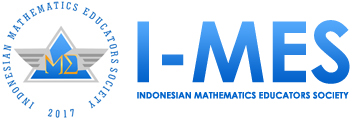Pencapaian Kemampuan Pemahaman Matematis Siswa Menggunakan Model Lesson Study pada Pembelajaran Matematika Ekonomi
DOI:
https://doi.org/10.35706/sjme.v2i2.1292Abstract
Tujuan penelitian ini adalah menelaah peningkatan kemampuan pemahaman matematis siswa dengan menggunakan metode lesson study dibandingkan dengan pembelajaran langsung. Penelitian ini merupakan penelitian eksperimen dengan desain penelitian posttes only dengan populasi penelitian yaitu mahasiswa salah satu Perguruan Tinggi di Karawang. Instrumen tes mencakup tes kemampuan pemahaman matematis dengan indikator dan variabel yang diukur adalah tingkat kemampuan pemahaman matematis. Data diolah menggunkan Software SPSS versi 22 for Windows, hasil penelitian ini menunjukkan bahwa peningkatan kemampuan pemahaman matematis mahasiswa yang memperoleh pembelajaran dengan model lesson study lebih baik dibandingkan dengan pembelajaran langsung. Jadi dapat disimpulkan model lesson study dapat meningkatkan hasil belajar matematika khususnya mata kuliah matematika ekonomi.
Downloads
References
Cai, J., & Ding, M. (2015). On mathematical understanding: perspectives of experienced Chinese mathematics teachers. Journal of Mathematics Teacher Education, 18(5). doi: 10.1007/s10857-015-9325-8.
Lewis, C.C. (2002). Lesson Study: A Handbook of Teacher-LedInstructional Change, Philadelphia, PA: Research for BetterSchools, Inc.
Minarni, A. (2017). On Eight Grade Students Understanding in Solving Mathematical Problems. Asian Social Science, 13(12), 86-96. doi: 10.5539/ass.v13n12p86.
Rohmah, M. S. (2013). Pendekatan Brainstorming Teknik Round-Robin untuk Meningkatkan Kemampuan Penalaran, Komunikasi Matematis dan Self-Awarenes Siswa SMP. Tesis. Sekolah Pascasarjana UPI. Bandung: Tidak diterbitkan.
Inerson, P.W., and Yoshida, M. (2005). Building Our Understanding of Lesson Study. Philadelphia, PA: Research for Better Schools.
Downloads
Published
How to Cite
Issue
Section
License
Authors who publish with this journal agree to the following terms:
- Authors retain copyright and grant the journal right of first publication with the work simultaneously licensed under a Creative Commons Attribution License that allows others to share the work with an acknowledgment of the work's authorship and initial publication in this journal.
- Authors are able to enter into separate, additional contractual arrangements for the non-exclusive distribution of the journal's published version of the work (e.g., post it to an institutional repository or publish it in a book), with an acknowledgment of its initial publication in this journal.
- Authors are permitted and encouraged to post their work online (e.g., in institutional repositories or on their website) prior to and during the submission process, as it can lead to productive exchanges, as well as earlier and greater citation of published work (See The Effect of Open Access).











